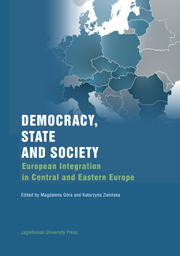Book contents
- Frontmatter
- Contents
- List of contributors
- Europeanisation in the EU New Member States. Aspects and Research Agendas
- Part one Democracy after Enlargement
- Part two Identity Transformations
- Part three Civil Society Organisations in Central and Eastern Europe
- Bottom-up Europeanisation: Civil Society Involvement and EU Governance in the New Member States
- The Europeanisation of Social Movements in the Czech Republic: the EU and Local Women's Groups
- The European Union as Political Resource: NGOs as Change Agents?
- Undiscovered Avenues? Estonian Civil Society Organisations as Agents of Europeanisation
- Part four Europeanisation of International Relations
- Index
The European Union as Political Resource: NGOs as Change Agents?
from Part three - Civil Society Organisations in Central and Eastern Europe
Published online by Cambridge University Press: 05 September 2014
- Frontmatter
- Contents
- List of contributors
- Europeanisation in the EU New Member States. Aspects and Research Agendas
- Part one Democracy after Enlargement
- Part two Identity Transformations
- Part three Civil Society Organisations in Central and Eastern Europe
- Bottom-up Europeanisation: Civil Society Involvement and EU Governance in the New Member States
- The Europeanisation of Social Movements in the Czech Republic: the EU and Local Women's Groups
- The European Union as Political Resource: NGOs as Change Agents?
- Undiscovered Avenues? Estonian Civil Society Organisations as Agents of Europeanisation
- Part four Europeanisation of International Relations
- Index
Summary
Abstract: A number of Europeanisation scholars maintain that accession to the European Union (EU) provides non-state actors with new opportunities to strengthen their position in the opportunity structure, even in areas where there is no clear EU policy or law-exerting pressure from above. However, to date there has been little research focusing on whether non-governmental organisations (NGOs) in Central and Eastern Europe have been able to use the EU in this way. In order to address this gap, this article considers whether, how and to what effect Polish women's rights organisations have deployed four types of EU political resource: arenas, policy instruments, funding programmes and points of reference. The research question is analysed through two different case studies: one on equality in the workplace, where there is a strong EU competence, and one on sexual and reproductive health and rights, where there is no EU competence. The case studies find that the use of EU resources did empower these organisations domestically, but to a lesser extent than expected, particularly where there was no EU pressure from above. In areas where the EU offers the greatest opportunities it also imposes constraints.
Introduction
From the outset, the Europeanisation literature has been concerned with the extent to which European Union (EU)-level institutions, policies and processes alter domestic opportunity structures.
- Type
- Chapter
- Information
- Democracy, State and SocietyEuropean Integration in Central and Eastern Europe, pp. 201 - 220Publisher: Jagiellonian University PressPrint publication year: 2011



